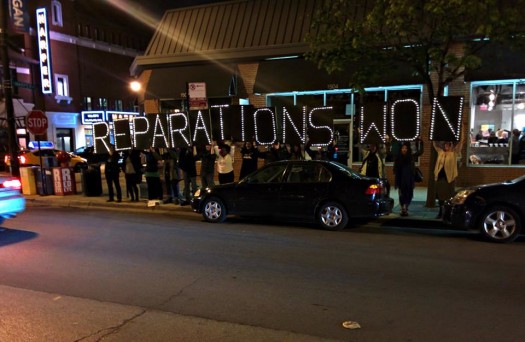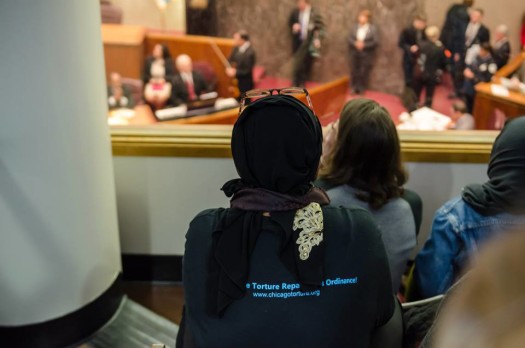Police Torture, Reparations and Echoes from the ‘House of Screams’
Yesterday, the Chicago City Council passed historic legislation to provide reparations for Burge police torture survivors. The package that was approved includes:
“a formal apology for the torture; specialized counseling services to the Burge torture survivors and their family members on the South Side; free enrollment and job training in City Colleges for survivors and family members (including grandchildren) as well as prioritized access to other City programs, including help with housing, transportation and senior care; a history lesson about the Burge torture cases taught in Chicago Public schools to 8th and 10th graders; the construction of a permanent public memorial to the survivors; and it sets aside $5.5 million for a Reparations Fund for Burge Torture Victims that will allow the survivors with us today to receive financial compensation for the torture they endured.”
Chicago is the first municipality in the U.S. to legislate reparations for survivors and victims of racist police violence. This victory was an improbable one. In his book “Unspeakable Acts, Ordinary People” published in 2000, journalist John Conroy offered a bleak assessment of the city’s response to allegations about Burge and his henchmen’s torture:
“The citizens of Chicago were unmoved. The clergy showed no leadership; with the exception of a few mostly low-ranking ministers, religious officials were silent. In the absence of any clamor, politicians showed no interest. Reporters, hearing no complaint, conducted no investigations, and editorial writers launched no crusades. State and federal prosecutors, feeling no pressure from the press or the public, hearing no moral commentary from the religious quarter, prosecuted no one. Judges, seeing no officer indicted and hearing no officer speak against his comrades, could therefore comfortably dismiss claims of torture, and with few exceptions, they did.
I found I did not have to journey far to learn that torture is something we abhor only when it is done to someone we like, preferably someone we like who lives in another country (p. 240).”
Fifteen years later, I listened from the third floor of City Hall as the Mayor and members of the City Council apologized for the torture endured by over 118 Black people at the hands of Burge and his henchmen. It was a miraculous moment.
What changed between Conroy’s description of an apathetic public response to allegations of Burge’s torture and yesterday’s Council vote on reparations? I actually think that Conroy was too dismissive of the organizing that took place in the 1990s. He thought that the protests were mostly insignificant and small. It’s a reminder, I think, that our perspectives on historical moments that we inhabit can sometimes be myopic. Conroy could not have known that the organizing in the 90s would serve as a foundation and a road map for efforts into the future. He was right that the political class, the 4th estate and most of the public were generally apathetic about the allegations of police torture. But I think that he also underestimated the importance of the sustained resistance led by groups like Citizens Alert, Black People Against Torture, the People’s Law Office and more. There were small victories along the way. Our historic achievement yesterday is owed to those hard-fought wins. The organizing and activism that began in the late 80s took the form of protests, advocacy, litigation, and storytelling (including Conroy’s powerful investigative journalism). Struggle and organizing matter. Change is too often slow. But sometimes we do win.
I became immersed in the Burge reparations campaign last Fall. Over the past six months, a coalition of individuals and groups organized tirelessly to pass this legislation. We held rallies, sing ins, marches, light actions, train takeovers, exhibition-ins, and more. The price of being immersed in this struggle is to be a witness to unspeakable acts of cruelty committed against other human beings. Burge and his fellow police officers electrocuted, beat, suffocated and generally tortured dozens of people over two decades. The rooms where Commander Jon Burge and his fellow officers tortured and forced confessions from suspects were called the “House[s] of Screams.” Those screams echoed in my head yesterday as I heard the Chicago City Council vote on the reparations legislation for survivors of Burge’s torture. Slowly those screams became whispers: thank you for believing us and for refusing to forget, they seemed to say.
To focus on such harms is painful and can lead to despair. Yet by organizing for some justice for torture survivors, I’ve seen and experienced incredible kindness, selflessness and compassion. This is what sustains my hope. I’m convinced that injustice and oppression will not have the last word. Last night, I attended a gathering of friends and comrades who have in their own ways contributed to this struggle. Some have spent the better part of 3 decades fighting to bring some justice to the torture survivors. I was asked to say a few words and I had difficulty expressing my feelings and thoughts. As I reached for my words, I was overcome at seeing the now old Black men standing before me. A couple had been brutalized in the early 1970s. I wasn’t eloquent last night but my words were heartfelt. I held it together but when I got home, I cried. They were tears of relief, gratitude, and most of all of love.
There will be time in the coming days and weeks to reflect and to find my words. But for today, let it be known that here in Chicago, we were determined not to forget the atrocities committed in our names by the police. We resisted the violence of fading memories and fought to preserve the knowledge of atrocities for which we all bear some responsibility. We struggled with survivors of torture and yesterday, we won.


